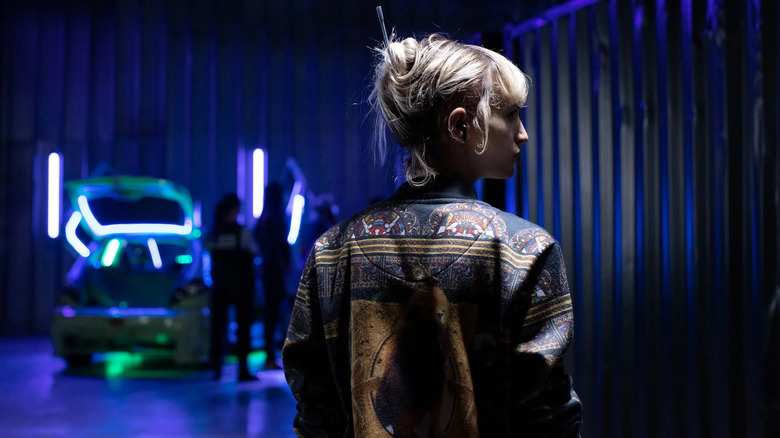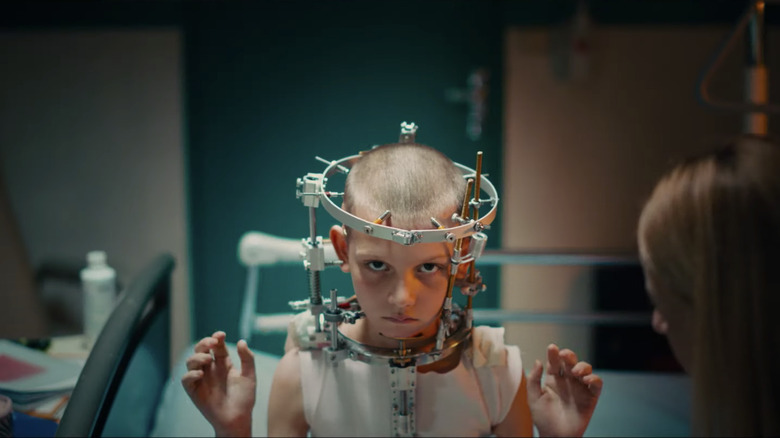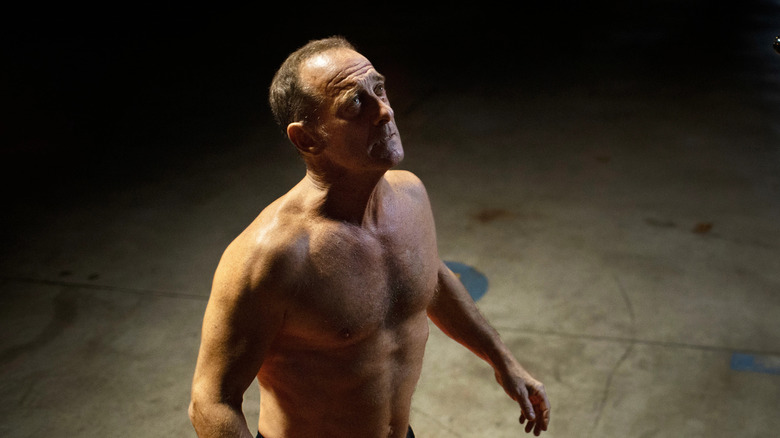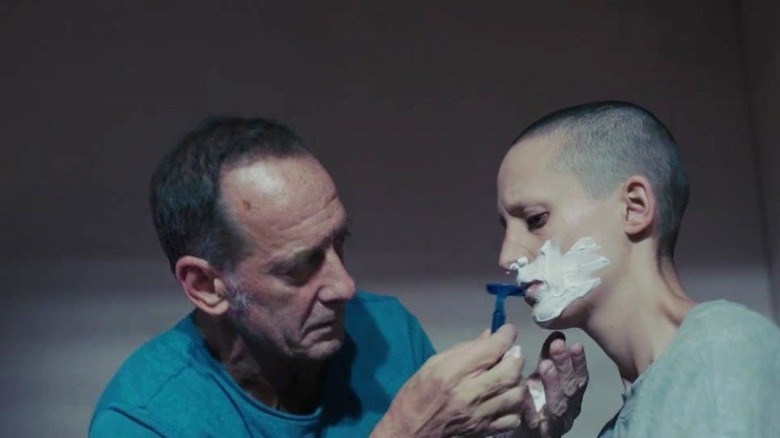Titane Ending Explained: Finding Your True Family
Julia Ducornau's Palme d'Or-winning second feature, "Titane," is a film with a lot of layers. It is a movie that is many things at once in a way that not many movies are: a horror story, a family drama, and a hopeful story about acceptance in spite of the drama and the terror. It is cathartic in ways most films dream of — and that most people assume just doesn't come with the genre.
"Titane" follows first-time actress Agathe Rousselle as Alexia, an exotic dancer and serial killer who has a sexual entanglement with a vehicle after a night of performing at an auto club. After one too many local kills, she decides on an unconventional method of hiding from the law: posing as a missing child 15 years after his disappearance, and moving in with the boy's father (Vincent Lindon). From there, she is forced to reckon with the ways her body is changing while keeping up the masquerade that is essential to her survival, all while coming to terms with what love and family truly means to her.
Like the rest of the film before it, the movie's ending is surprising and, at moments, poignant. It fleshes out all three areas of the story and weaves them together for a memorable and crucial climax — but what can we take away from the ending?
What happens at the end of Titane?
After a lot of work on Alexia's part to keep her heavily pregnant body hidden by binding — and a touching and wordless moment near the end of the film in which her female body is discovered by Vincent after her towel accidentally falls after she gets out of a shower — she is unable to keep up her charade when she goes into labor. Throughout the pregnancy, Alexia noticed unusual bodily changes, including motor oil leaking from her breasts and tears in her abdominal skin revealing metal from inside her as her baby bump grew.
When she is discovered in labor by Vincent, she reveals herself to him, including her real name. She begs him to help her give birth, which he does nearly without question. Her body cracks and breaks as she endures a painful and shocking delivery, which kills her, but not before she gives birth to a baby with a titanium spine. Vincent receives the child warmly, and cradles it to his chest. The film ends on his final line accompanied by a shot of his awestruck face processing what just happened to him, and how everything has been leading to this: "I'm here."
But what's really going on here?
After simply processing the ending at face value, the themes and imagery of the movie's conclusion become glaringly apparent. It's obvious that the film firmly inhabits those aforementioned three subgenre spaces — horror, family, and a story about acceptance — and the ending is what seals that deal.
There is detailed and gruesome body horror at play. The desperate parent must reconcile with the fact that they did not actually find their missing child. And as for acceptance, that is perhaps the most beautiful part of this climactic and excruciating conclusion. Vincent comes fully into his acceptance of Alexia as a person — a person who is not his son, but whom he has bonded with like a son — in those final minutes.
Throughout her time with him in the film, they climb emotional mountains together, Alexia trying to fully allow herself to succumb to being loved and Vincent attempting to build a new bond knowing it'll never be the same as it was before his child disappeared. It's slow going and at times, it seems like there's no way it can work. And of course, ultimately, there isn't; there's bound to be a time where things slip and they do, twice in the film for Alexia, and she is exposed. Additionally, binding her body to keep up the masquerade is excruciating for her, and there's no way to keep that going indefinitely. Plus, a baby has to come out sometime.
Non-judgmental love
When Vincent first sees Alexia's body accidentally near the end of the film, he is overcome and immediately brings her into a tight hug after covering her back up. It is a sobering moment for him, and the audience certainly feels it, but he takes it in stride — he takes it exactly how you expect a person so desperate to feel the love of their child again would. He doesn't care.
In the film's climax, there is no denying his son is not who he said he was. But that doesn't matter anymore. What matters is love, and life, and how we find it in our hearts to continue loving and continue living. Early in the film, Alexia left a family that was, for all intents and purposes, fairly loving, but it was clear she didn't entirely feel a true connection with them. Not like the bond she grows with Vincent, free from all the trappings of her old life. And yes, she struggles with returning to those vices, but Vincent's non-judgmental love helps her heal.
So, in the end, "Titane" is about a lot of things, but above all, it is about how finding your true family can unlock love and hope abound, no matter how your story ends. Ultimately, Alexia found the love she so desperately craved in the deepest pit of her soul. She found it in Vincent and the way he accepted her in spite of everything, and he found it in her. Through her child, that bond lives on; in a strange way she never anticipated, it was Alexia's gift to him, another real love to carry him through his days and ease the loss of not one child, but now two.



